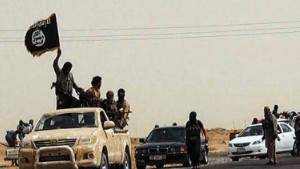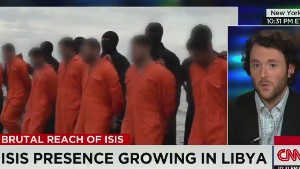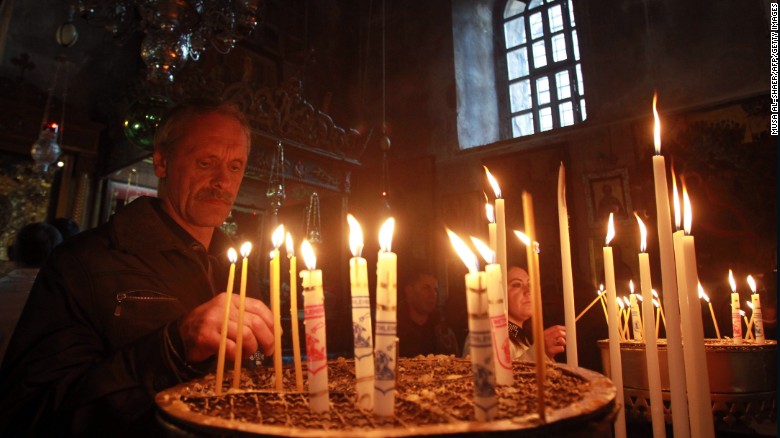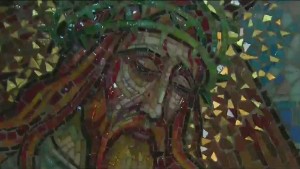Militants Abduct more Christians in Syria
Source:CbnBEIRUT - Islamic State militants have seized more Christians from their homes in northeastern Syria.
Fears are mounting over the fate of the abducted Christians, with
hundreds taken captive, according to human rights activists.
The
abductions began Monday, when militants attacked a cluster of villages,
sending thousands of people fleeing to safer areas.
About 200
Assyrians and other Christians gathered in a church near Beirut Thursday
in solidarity with the victims in Syria and Iraq. One man said, "We are
praying for them and we are fasting." Others cried openly.
Assyrian refugee Thaera Jamil asked, "What was their sin?" She lamented
that "there is no one listening to the voice of the Christians."
Saturday, 28 February 2015
ISIS Has Begun Executing Captured Christians, According to Report
ISIS Has Begun Executing Captured Christians, According to Report
Unconfirmed report warns of mass execution of "infidels" tomorrow.
 Assyrian Church in Beirut
Assyrian Church in Beirut A priest who has been feeding reports to Christian aid agencies around the world, including Aleteia partner Aid to the Church in Need, said today that a Christian Assyrian lawyer in the city of Hassakah told him that about 15 young Assyrians "are martyred. Many of them were fighting to defend and protect the villages and families."
Archimandrite Emanuel Youkhana of CAPNI, the Christian Aid Program in Iraq, said that in the Christian village of Tel Hormizd: 14 fighters, two of whom were women, were killed. One of the women may have been beheaded, he said. Another 13 fighters from different villages were captured.
Altogether, including civilians, as many as 350 Christians from the area have been captured, he reported—many more than the 70 originally reported. Their fate is unknown, and there is much speculation. He said that an unconfirmed report said that a mosque in the Arab Sunni village of Bab Alfaraj was calling people to attend a "mass killing of infidels in the mountain of Abdul Aziz on Friday."
Archimandrite Youkhana reported that none of the residents of one Christian village that the Islamic State attacked, Tel Shamiram, were able to escape. This village had 51 families, with an average of five persons per family, he said.
"There was fire exchange between the fighters protecting the village and IS terrorist group," the priest wrote. "It is believed there are casualties and many are Assyrians are been killed in the village. No news on the destiny of the families. Most probably they are been captured and transported to Mount Abdul Aziz, a nearby mount/region controlled by IS."
Other villages attacked included Tel Jazira, Tel Gouran, Tel Feytha, and Qabir Shamiya.
He said that 800 families displaced from their villages have taken refuge in Hassakah and 175 in Qamishli. Those numbers are expected to eventually total 1200 families. The only ones left are fighters in Tel Tamar who are protecting the town together with Kurdish fighters. "They hope the region to be liberated and families return," he said.
According to a report by Catholic News Agency, civilians fleeing to the Turkish border have been stranded as they are not allowed to cross.
“There are 200 families who were running away and trying to escape to Turkey, but the border is closed for Syrians. No Syrian can cross into Turkey,” Archbishop Jacques Behnan Hindo told CNA Feb. 26.
Archbishop Hindo oversees the Syrian Archdiocese of Hassake, which is located in the Al-Hasakah region of Syria. The region sits between the country’s borders with both Turkey and Iraq.
The U.N. Security Council on Wednesday evening “strongly condemned” this week's abductions and demanded the immediate release of others taken by the Islamic State and similar groups. The United States on Wednesday condemned the attacks on Assyrian Christian villages, which it said included the burning of homes and churches and abduction of women, children and the elderly.
Reuters news agency has this background on the situation:
The region is strategically important to Islamic State as one of the
bridges between land it controls in Syria and Iraq. In recent weeks it
has lost ground in northeast Syria after being pushed out of the Kurdish
town of Kobani in January by Kurdish forces backed by U.S.-led
airstrikes.
These same strikes, however, have been unable to stop its advance into smaller villages.
Heavy fighting continued through Wednesday night between Syrian Kurdish militants and Islamic State, Kurdish officials and [Syrian Observatory for Human Rights] said.
"ISIS now controls 10 Christian villages," observatory head Rami Abdulrahman said by phone, using an acronym for Islamic State. "They have taken the people they kidnapped away from the villages and into their territory," he said.
These same strikes, however, have been unable to stop its advance into smaller villages.
Heavy fighting continued through Wednesday night between Syrian Kurdish militants and Islamic State, Kurdish officials and [Syrian Observatory for Human Rights] said.
"ISIS now controls 10 Christian villages," observatory head Rami Abdulrahman said by phone, using an acronym for Islamic State. "They have taken the people they kidnapped away from the villages and into their territory," he said.
'I expect Christians in Iraq will be gone'- CNN REPORTER
'I expect Christians in Iraq will be gone'
Still,
such migrant workers are in the shadows and under threat of
deportation, and more, if caught praying openly or communally. They
haven't been in the Middle East long, and there's no guarantee any one
of them will stay long, either.
That's in contrast to other Christian communities that have been in the Middle East for centuries.

Report: ISIS holding 260+ Syrian Christian hostages 01:39
PLAY VIDEO
They're
people like Assyrians, whose ancestors were part a cradle of modern
civilization. They began converting to Christianity within years of
Jesus' death and have kept the faith despite the growth of Islam in
their homeland and, most shockingly, the Assyrian genocide of the 1910s
and early 1920s.
Now those Assyrians in Iraq and Syria are under fire again.
Last August, ISIS militants overran Qaraqosh,
a historic Assyrian community of about 50,000 people and Iraq's largest
Christian city. And in recent days, the terrorist group stormed
Assyrian villages in northeastern Syria, taking some 262 people hostage,
said Assyrian Human Rights Network founder Osama Edward. Others fled
for their lives, including about 600 taking refuge in St. Mary's
Cathedral in al-Hasakah, Syria.
"We pray, we pray all the time," Romel David, who has 12 relatives thought to be among those kidnapped, told CNN affiliate KCRA.
"What we've heard is it was like a sea of black uniforms marching
through all the villages, burning down the churches, desecrating the
crosses and wreaking havoc."
ISIS has targeted other Christians in the region as well, like those in Mosul, Iraq, who were told last July to convert to Islam, pay a fine or face "death by sword."
Curry calls ISIS' actions against Christians "genocide." Yet it
shouldn't obscure the fact that, even before this group's emergence, the
number of Iraqi Christians was on the decline.

ISIS message to Christians: 'We're coming to get you' 03:00
PLAY VIDEO
Some
of that's due to a weak Iraqi central government and general
instability. Christians might also be hurt by their historic affiliation
with the Baath Party, once led by deposed Saddam Hussein (with the
Syrian branch led by embattled President Bashar al-Assad). Another
factor is the rise of militias and politicians who make Islam more
central to their missions, to the exclusion of others.
Curry,
from Open Doors USA, said Iraq had about 1.5 million Christians just
over a decade ago. That number is now under 150,000, something that he
attributes to family influences, government actions, communal pressure
and targeted violence from militant groups.
"In 10 years from now," Jenkins added, "I expect Christians in Iraq will be gone."
Amid killings and kidnappings, can Christianity survive in the Middle East?
Amid killings and kidnappings, can Christianity survive in the Middle East?

Christians light candles last month in the Church of the Nativity in the West Bank town of Bethlehem, the birthplace of Jesus.
Story highlights
- Christianity has long roots in the Middle East, starting with the birth of Jesus
- Expert: Their numbers have fallen in recent decades and should continue to fall
- There are exceptions, like migrant workers flooding Gulf states like Saudi Arabia
(CNN)Christianity
was born in Bethlehem, in what's now the West Bank. It took root among
people like the Assyrians, who flourished in ancient Mesopotamia. It
soon found a home in places like modern-day Turkey.
In other words, Christianity traces its past squarely to the Middle East.
But do Christians have a future there?
Recent headlines provide ample evidence for skepticism. It's hard to ignore the depravity of ISIS beheading 21 Egyptian Christians on a beach in Libya. Nor can one shake off stories of women and children among the 262 Christians captured by ISIS in Syria, one of several horrors faced by Christians in that nation and neighboring Iraq.

Christians risk lives retracing Jesus' footsteps 03:11
PLAY VIDEO
They're
not just feeling the heat from Islamic extremists: Just this week,
police in Jerusalem said they suspected radical right-wing Israelis were
to blame for defacing a Greek Orthodox seminary in Jerusalem with slurs maligning Jesus.
All
this strain, all this chaos has shrunk the percentage of the Middle
East's once-sizable population of openly practicing Christians.
While
no one is saying what's happening -- especially given the savagery of
ISIS -- isn't alarming, that doesn't make it surprising. The Middle East
has changed a lot since the first millennium A.D. for Christians. It
has also changed a lot over the past century: The percentage of
Christians relative to the Mideast's overall population has gone from
13.6% in 1910 to 4.2% in 2010, and it's expected to drop even further,
according to religious demographers Todd Johnson and Gina Zurlo.
"What
we're seeing right now," said Baylor University historical theologian
Philip Jenkins, "is the latest phase of something that has been going
for 100 years, pretty much."
Pastor Insists Jonathan Bribed CAN With 7 Billion Naira
Pastor Insists Jonathan Bribed CAN With 7 Billion Naira
Despite a denial by the national leadership of the
Christian Association of Nigeria (CAN) that it did not receive a seven
billion Naira bribe from President Goodluck Jonathan, the pastor who
broke the story last week insists the association was bribed.
Despite a denial by
the national leadership of the Christian Association of Nigeria (CAN)
that it did not receive a seven billion Naira bribe from President
Goodluck Jonathan, the pastor who broke the story last week insists the
association was bribed.
 President Goodluck Jonathan and Ayo Oritsejafor in Israel in 2013
State House Photo
And he says some people within the leadership have called him to confess
that his story was true and that what happened was wrong.
President Goodluck Jonathan and Ayo Oritsejafor in Israel in 2013
State House Photo
And he says some people within the leadership have called him to confess
that his story was true and that what happened was wrong.Addressing a well-attended press conference in Kaduna on Tuesday, Pastor Kallamu Musa Dikwa, who heads the Voice of Northern Christian Movement, declared that there were a lot of shenanigans in the present leadership of CAN, accusing it of betraying the vision of its founding fathers.
Dikwa reiterated that the CAN leadership received the funds on 21st of January, 2015, and gave N3 million to each of its state chapters.
In effect, the pastor is alleging that the CAN leadership distributed to its national membership a small fraction of what it received, keeping to itself well over N6 billion.
Of the response of the national leadership of CAN to his allegations, he told the journalists: “They even have denied me, and said I did not exist. That is why I came to you to confirm that what I said is true.”
He asserted that it was not the first time CAN was getting money like that, recalling 2013 when it got funds from the United States Nigerian group, CANAAN.
"They are our children, our Christians from Nigeria living in America,” Pastor Dikwa said. “We call them CANAAN (Christian Association of Nigerian Americans). They gave $50,000 to the victims of Boko Haram. After that, the CAN leader invited three people from Maiduguri and two from Damaturu and gave them N100,000 each. The victims know how much they (CAN) collected. Many of the leaders (Yobe and Borno CAN) started calling me. They say what happened is wrong and we have to correct it. I have documents here to show you some of the things I have been saying.”
This also means that when the national leadership received the $50,000 from CANAAN, it kept most of it from the victims of Boko Haram for whom it was intended.
"It was the same way that it happened when Jonathan went to Kwara in January. Someone there told me that CAN leadership was given money. I asked him if they called any newsmen. The man said they did not. I said, ok, let us wait. After some time, somebody called me. He said he has been giving his share. He said he has been given N3 million. He said each state was given N3 million. I called someone in the leadership of National CAN. He told me that it was a confirmed happening.”
Dikwa however vowed to protect that source with his life, as he will never disclose his name.
"The states branches of CAN collected the money. But they don’t know how much it is, whether it is N6 or N7billion. I have sent text messages to the leadership of CAN telling them to repent or I will make it open. So that is why I have decided to let the world know. Some of the CAN leadership have called me and said what happened was wrong and that it must be corrected. I said yes, it can be done.”
DON'T SELL YOUR FUTURE
Our lives in danger for endorsing Buhari – Northern Christians forum
A group of christians under the umbrella of Northern Christian Leaders Eagle Eyes Forum (NCLEEF) has raised the alarm that the lives of its officials are under serious threat following their endorsement of the presidential candidate of All Progressives Congress (APC), General Muhammadu Buhari.
Addressing the press yesterday, Chairman of the Forum, Pastor Aminchi Habu said President Goodluck Jonathan’s tenure in the past six years was a disappointment to Nigerians; particularly Christian community which he claimed gave the president the winning votes in the 2011 general elections.
Pastor Habu said it was based on this failing that the Christian Forum decided to dish President Jonathan and endorse General Buhari who they believe could rid the country of insecurity and underdevelopment.
However, speaking to Saturday Sun in a telephone chat over the allegation and claims of the Forum, the executive secretary, Christian Association of Nigeria (CAN), Northern States and Abuja, Professor Daniel Babayi advised members of the group, as men of God, to stay off politics.
“We are not expected to be partisan, CAN as an institution is apolitical, CAN as an institution does not, as a policy, identify with any political party or candidate. So CAN cannot endorse any person or party”, Babayi said.
But Pastor Habu insisted, “Our decision to endorse Buhari was informed by our patriotic commitment to build a free, fair and a secular society where the inheritance should be justice to all.
“After the endorsement, our members, especially the Chairman of this Forum have continued to receive threatening phone calls and text messages, labelling them a sell-out group who have abandoned a Christian candidate in the person of President Goodluck Jonathan.
“We supported the present government in 2003, 2007 and 2011, however after critical analysis, the Forum decided to endorse General Muhammadu Buhari based on abysmal performance, the security challenges, outrageous corruption in public places, coupled with economic downturn.
“Our enemies accused us of collecting N500 million from General Buhari, this accusation is not wrong, but a blatant lie from the pit of hell. We charge anybody with concrete evidence of any money collected by anybody on behalf of the Forum to come forward with such evidence.
“The endorsement of Buhari was done publicly, and not secret like our accusers will do, yet segment of corrupt minds are employed to water down the good intention of the Forum which is to build bridges and promote peaceful co-existence without our complex diversity.
“We shall not betray our trust as religious leaders for any monetary consideration. We shall do everything humanly possible within our calling to protect the interest of our image.
“We are therefore calling on the Christians not to be deceived by these religious bigots and shun sentiment by voting the right candidate in the forthcoming general election”.
Wednesday, 11 February 2015
BUHARI VS JONATHAN
Nigerians are afraid that Buhari might islamize the nation cos most
Muslim leaders always practice their belief in every position they are
just like the case of Sanusi. We should be more worried why Christian
leaders don't practice Christianity when they attain that position. If
Jonathan had practiced Christianity, he would have being the best
president Nigeria ever had. In my own opinion, Christ virtues are the
best available anywhere, anytime. It is the best for the growth and
peace of any nation. Though, every thing in life has its own flaws,
religion inclusive. But that is more reason why Christianity is not just
a religion. One thing I will not accept is seeing one religious
fanatics being fraudulent while the other is being violent. NIGERIA I
CARE!

Subscribe to:
Posts (Atom)


